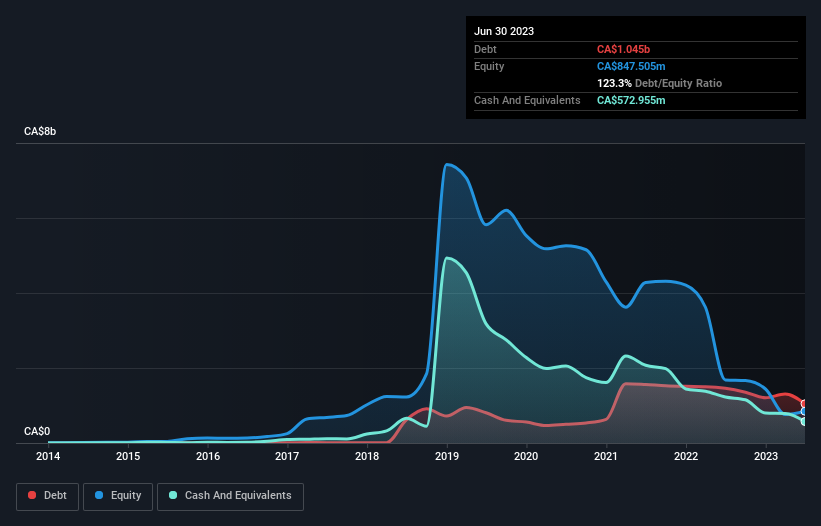
The external fund manager backed by Berkshire Hathaway's Charlie Munger, Li Lu, makes no bones about it when he says 'The biggest investment risk is not the volatility of prices, but whether you will suffer a permanent loss of capital.' So it might be obvious that you need to consider debt, when you think about how risky any given stock is, because too much debt can sink a company. Importantly, Canopy Growth Corporation (TSE:WEED) does carry debt. But is this debt a concern to shareholders?
What Risk Does Debt Bring?
Generally speaking, debt only becomes a real problem when a company can't easily pay it off, either by raising capital or with its own cash flow. In the worst case scenario, a company can go bankrupt if it cannot pay its creditors. However, a more frequent (but still costly) occurrence is where a company must issue shares at bargain-basement prices, permanently diluting shareholders, just to shore up its balance sheet. Of course, the upside of debt is that it often represents cheap capital, especially when it replaces dilution in a company with the ability to reinvest at high rates of return. When we think about a company's use of debt, we first look at cash and debt together.
See our latest analysis for Canopy Growth
How Much Debt Does Canopy Growth Carry?
You can click the graphic below for the historical numbers, but it shows that Canopy Growth had CA$1.05b of debt in June 2023, down from CA$1.46b, one year before. However, it does have CA$573.0m in cash offsetting this, leading to net debt of about CA$472.1m.

How Healthy Is Canopy Growth's Balance Sheet?
We can see from the most recent balance sheet that Canopy Growth had liabilities of CA$451.2m falling due within a year, and liabilities of CA$891.9m due beyond that. Offsetting this, it had CA$573.0m in cash and CA$128.5m in receivables that were due within 12 months. So it has liabilities totalling CA$641.6m more than its cash and near-term receivables, combined.
While this might seem like a lot, it is not so bad since Canopy Growth has a market capitalization of CA$1.34b, and so it could probably strengthen its balance sheet by raising capital if it needed to. But we definitely want to keep our eyes open to indications that its debt is bringing too much risk. There's no doubt that we learn most about debt from the balance sheet. But ultimately the future profitability of the business will decide if Canopy Growth can strengthen its balance sheet over time. So if you're focused on the future you can check out this free report showing analyst profit forecasts.
In the last year Canopy Growth had a loss before interest and tax, and actually shrunk its revenue by 15%, to CA$406m. That's not what we would hope to see.
Caveat Emptor
Not only did Canopy Growth's revenue slip over the last twelve months, but it also produced negative earnings before interest and tax (EBIT). Its EBIT loss was a whopping CA$444m. When we look at that and recall the liabilities on its balance sheet, relative to cash, it seems unwise to us for the company to have any debt. So we think its balance sheet is a little strained, though not beyond repair. Another cause for caution is that is bled CA$576m in negative free cash flow over the last twelve months. So in short it's a really risky stock. There's no doubt that we learn most about debt from the balance sheet. However, not all investment risk resides within the balance sheet - far from it. Be aware that Canopy Growth is showing 4 warning signs in our investment analysis , and 2 of those don't sit too well with us...
If you're interested in investing in businesses that can grow profits without the burden of debt, then check out this free list of growing businesses that have net cash on the balance sheet.
New: AI Stock Screener & Alerts
Our new AI Stock Screener scans the market every day to uncover opportunities.
• Dividend Powerhouses (3%+ Yield)
• Undervalued Small Caps with Insider Buying
• High growth Tech and AI Companies
Or build your own from over 50 metrics.
Have feedback on this article? Concerned about the content? Get in touch with us directly. Alternatively, email editorial-team (at) simplywallst.com.
This article by Simply Wall St is general in nature. We provide commentary based on historical data and analyst forecasts only using an unbiased methodology and our articles are not intended to be financial advice. It does not constitute a recommendation to buy or sell any stock, and does not take account of your objectives, or your financial situation. We aim to bring you long-term focused analysis driven by fundamental data. Note that our analysis may not factor in the latest price-sensitive company announcements or qualitative material. Simply Wall St has no position in any stocks mentioned.
About TSX:WEED
Canopy Growth
Engages in the production, distribution, and sale of cannabis and hemp-based products for recreational and medical purposes primarily in the United States, Canada, Germany, and internationally.
Mediocre balance sheet very low.


